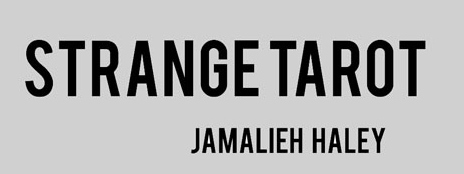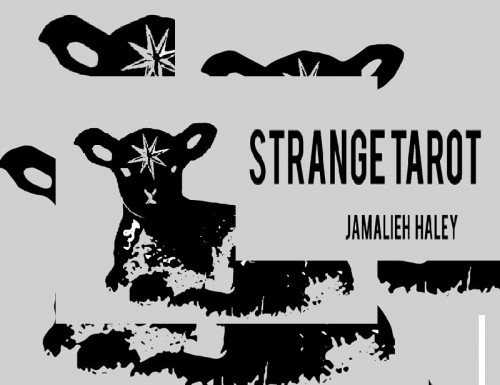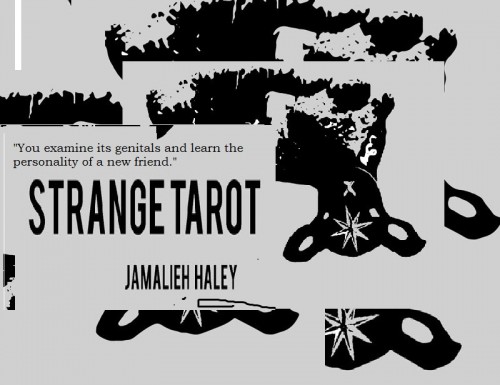
1) Reading and experiencing “Strange Tarot” is like spying on a tenuous and tense relationship in which one part of a self guides and chides the other. At some points, even, it feels like it incarnates you. (Most Tarot Poetry’s an exhausting exercise in ekphrasis. Yawn. That, or the Tarot Poems range so far afield that there’s nothing Tarot about them. Jamalieh Haley’s “Strange Tarot” is still very much Tarot—superficially, in titles, imagery and in the way the poems on the page are shaped like Tarot cards—but indeed a strange, strange Tarot, benefiting and enhanced greatly from psychedelic imagery that only issues from a highly pressurized and agitated mental state.)
“Arrive inside your silhouette. Open the china. Do anything there.”
2) The critical element of Tarot is the relationship between the fortune teller and the supplicant. And, for me, in Strange Tarot the self is telling itself its own fortune. The self betrothed to itself. And this “conversation” (or fortune telling) within the self, which we are privileged to enjoy and shudder at, is rife with flaring tensions and instability, extrusions of cruelty and violence verging constantly towards, like suicide, a kind of desperate, ritualized and salvational make-up sex. Yes, the fire of consummation is what will save and consume.
And let me say again how lucky we are to be overhearing and looking in on this lover’s quarrel of the soul (and itself).
“throw down salvation to the beast you demand.”

“. . .cut up your head into a paper mask and transform everything into the sun.”
3) The voice of these poems is high-strung, edgy, often cruel and sadistic, but masochistic too (in order to properly enact and relish transfiguring cruelty the true sadist benefits from being able to properly imagine and experience the impact of his/her sadistic artistry).
And a tender sadist is always the most compelling. Here, the voice of these poems is both victim and priest(ess). This voice loves, too. But this voice, talking to itself (who else can one really talk to?) is often bored. And often we get to experience, as in the most tender and beautiful moments of Guyotat’s Tomb for 500,000 Soldiers, the voice, in respites from the horror, violence and struggle, standing on a balcony staring out at the glowing sunset hills.
“You are one of two statues who watch the moon in black and white lands escape fifty yards ahead.”
4) I spoke before of the poems shaped like Tarot cards. And I’d like to add how well made and organized the poems are, individually and sequentially. There is a coolness of surface at play here that juxtaposes eerily and beautifully against the fiery violence that substantiate the “conversation.” The effect is that of an impeccable fitted-out Dominatrix vocalizing clipped and controlled commands as she realizes her love, desire and disappointments upon the slave object (in this case, herself).
“You examine its genitals and learn the personality of a new friend.”

“What happens to you overnight is in the red dimension.”
5) The voice of this book seems to enjoy the safety of old worlds and words, old controls and figurations, like those, perhaps, of a John Donne. (“Your mind is a garden architect. His wife, bent to deflect the purpose of flowers. . .Your job is to turn sandpaper into pleasure”) but as I pushed into the latter third of it I thought of the famous song “Ring of Fire” (performed most vitally by Johnny Cash though written by June Carter Cash and Merle Kilgore) but here, in Strange Tarot, the inevitable suck of the circle (ring) is replaced by the unrelenting draw of the sexual triangle.
Yes, for all the heady, though intense, “conversation” the voice seems to trust above all and ultimately in the blood and bone beneath the cool, quarreling fire-seething skin it performs through. That is to say the voice knows the way out (or the way forward) can only be realized in its submission to its own body (submission to the animal or “beast” within).
The experience of this book is both lovely and disturbing. Like stepping into the swirling mind of a violent adult-child. Or the parent. All of it.
“You’re approaching the color that runs the trance blast into the mirror. Ouch.”

Jamalieh Haley lives in Portland, Oregon where she co-curates If Not For Kidnap and teaches writing. Her work has appeared or is forthcoming in Interrupture, Sink Review, Everyday Genius, Sixth Finch, and other lovely places. You can find Strange Tarot here at Poor Claudia
Tags: 5 Points, Jamalieh Haley
